Introduction
Grandparents are living treasure troves of wisdom, stories, and experiences. Asking them the right questions is like opening a time capsule filled with memories, life lessons, and values that can enrich your life and deepen your connection with them. Not only do these conversations help you learn more about your family history, but they also create opportunities to bond in meaningful ways.
Talking to your grandparents about their lives can offer fascinating and invaluable insights. These discussions can also strengthen family bonds, creating lasting memories for everyone involved. Whether you want to understand their childhood, their views on life, or their favorite memories, this guide will help you ask the right questions.
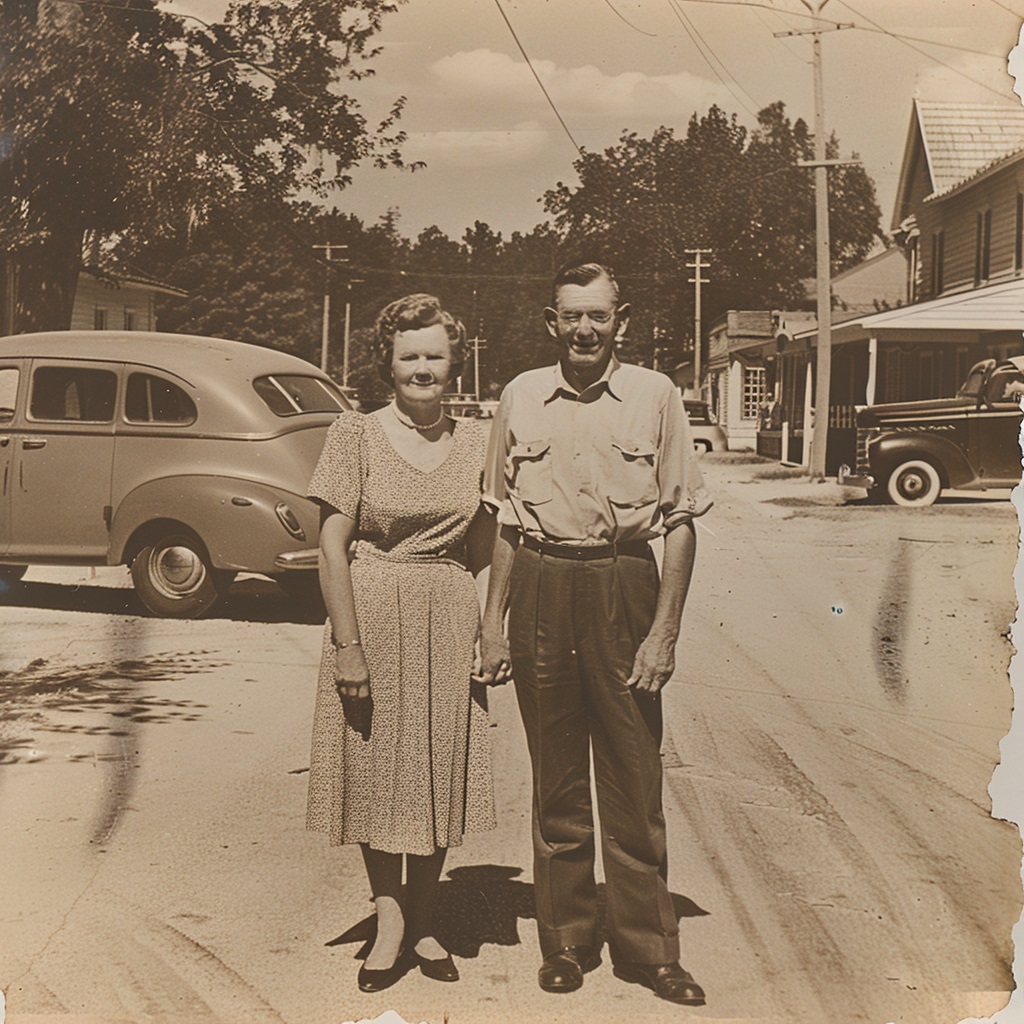
A glimpse into the early life of grandparents, capturing the essence of their youth in a simpler time.”
Getting to Know Their Early Life
Childhood Memories
Understanding your grandparents’ childhood can give you a glimpse into a different world without the modern conveniences we take for granted. These questions will help you uncover the essence of their early years:
- What was your hometown like when you were a child?
- This question opens up a window into the environment they grew up in, whether it was a bustling city or a quiet rural area. You might hear about the local shops, parks, or streets where they played.
- What games and activities did you enjoy the most?
- Discovering what your grandparents did for fun can reveal much about the era they grew up in. Whether it was playing marbles, flying kites, or simply exploring the neighborhood, these stories often come with fond memories.
- Who were your childhood friends, and what did you do together?
- Learning about their childhood friends can bring their early social life into focus. It’s also a chance to hear about any childhood adventures or mischief they got into.
Family Dynamics Growing Up
Family plays a crucial role in shaping who we are. These questions will help you understand the family dynamics that influenced your grandparents:
- What was your relationship like with your parents and siblings?
- This question can reveal a lot about the home environment they grew up in. Were they close with their parents? Did they have sibling rivalries? Understanding these relationships can offer insights into their values and personalities.
- How did your family celebrate holidays and special occasions?
- Every family has its traditions. Whether it’s a special Christmas meal or a unique way of celebrating birthdays, these stories can connect you to your family’s past.
- Were there any family traditions that were particularly important to you?
- Traditions often carry significant emotional weight. Knowing which were important to your grandparents helps you appreciate and continue these traditions.
Education and School Life
Your grandparents’ school experiences might be very different from yours. These questions can help you explore their academic journey:
- What subjects did you enjoy the most in school?
- Whether they loved history, math, or art, this question gives insight into their interests and their passion as students.
- What were your favorite and least favorite teachers like?
- Teachers can leave a lasting impact, and learning about the ones who influenced your grandparents can be entertaining and enlightening.
- Did you participate in any extracurricular activities?
- Extracurricular activities can shape a person’s character and skills, from sports to drama clubs. This question might lead to stories of teamwork, creativity, and perseverance.
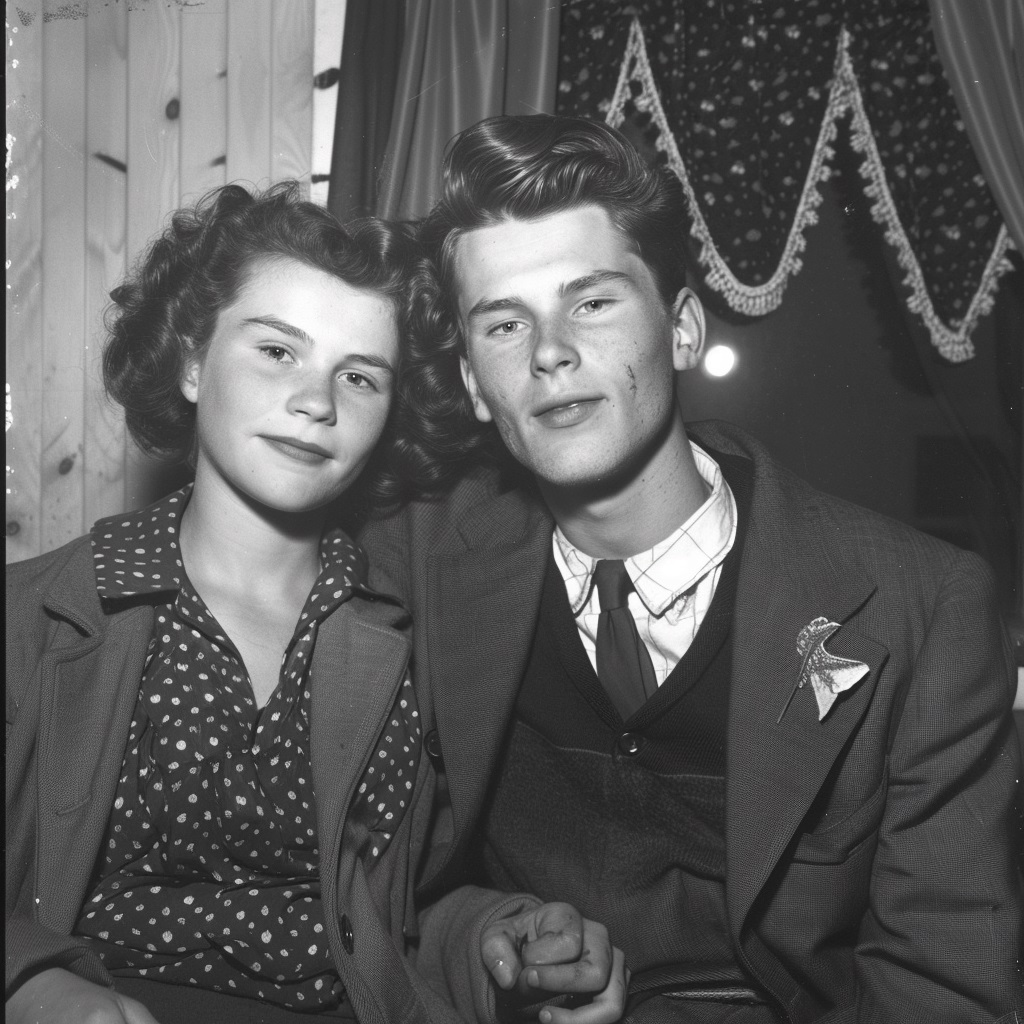
Adolescence and young adulthood: A time of discovery, friendships, and iconic cultural moments.
Life During Adolescence and Young Adulthood
Teenage Years and First Experiences
Adolescence is a time of discovery and firsts. These questions will help you uncover what it was like for your grandparents to grow up:
- What was it like being a teenager during your era?
- Teen years are formative, and this question can reveal what it was like to come of age in a different time. Whether it was the music, the fashion, or the societal norms, this question can lead to fascinating stories.
- What kind of music, fashion, and trends were popular?
- Trends come and go, but hearing about the ones your grandparents followed can give you a sense of the cultural landscape of their youth.
- Can you share your experience with your first job or significant milestones?
- First jobs or significant milestones like getting a driver’s license or graduating high school are essential moments in anyone’s life. These stories often carry valuable lessons or exciting anecdotes.
Early Career and Life Choices
Understanding the decisions that shaped your grandparents’ lives can offer valuable life lessons:
- How did you decide on your career path?
- This question can reveal the motivations and influences behind their professional choices, whether they followed a passion, took over a family business, or needed to earn a living.
- Were there any significant challenges or turning points in your early career?
- Every career has its ups and downs. Learning about your grandparents’ challenges can provide insight into their resilience and problem-solving abilities.
- What advice would you give to someone starting their career today?
- With years of experience, your grandparents likely have valuable advice to guide you or others in their career journeys.
Relationships and Marriage
Relationships form the foundation of life’s most important decisions. These questions delve into your grandparents’ experiences with love and marriage:
- How did you meet your spouse or significant other?
- This story is often filled with romance, chance encounters, or humor. It’s a wonderful way to learn about your family’s beginnings.
- What was your wedding like, and what do you remember most about that day?
- Weddings are special occasions, and hearing about the details—a big celebration or an intimate gathering—can be heartwarming.
- What were the early years of marriage like for you?
- The early years of marriage can be challenging but full of love and growth. This question can lead to stories of how they built their life together.
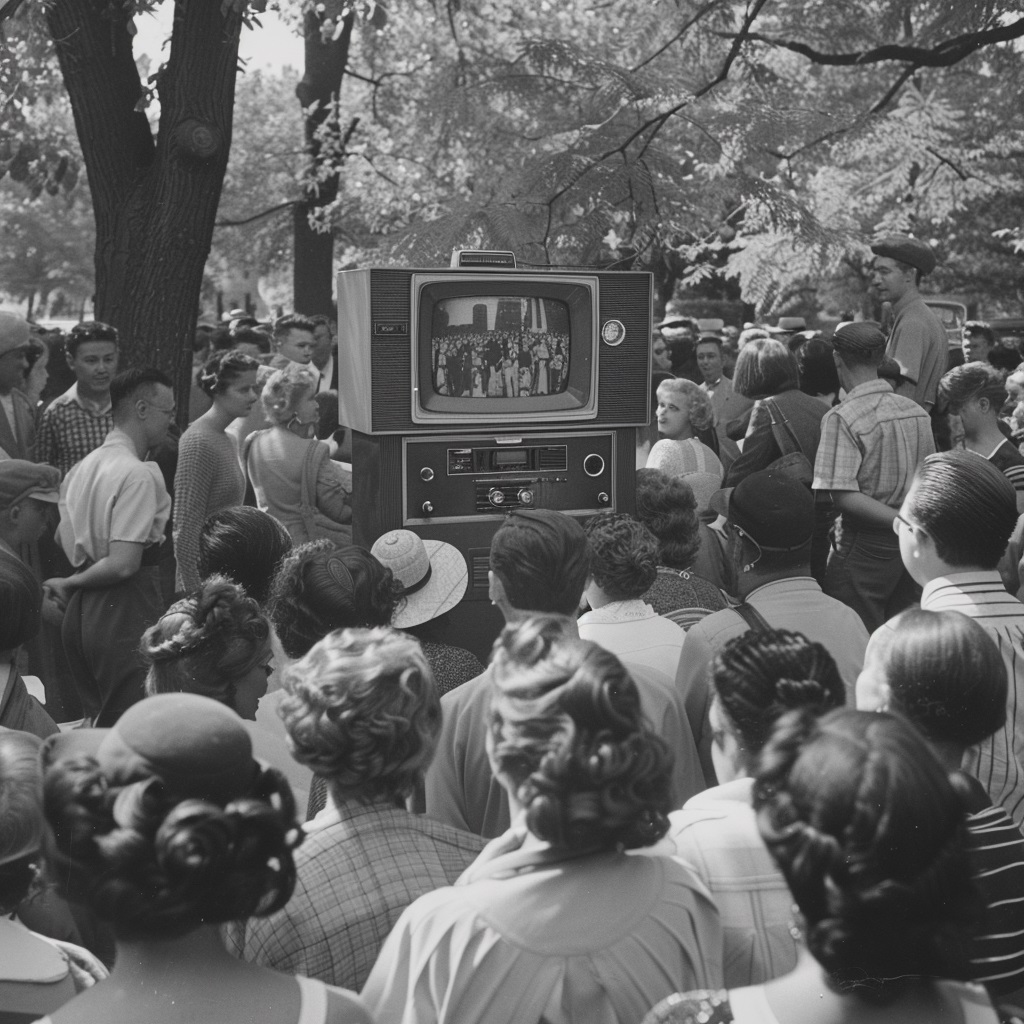
Witnessing history: Moments that shaped the world, as seen through the eyes of those who lived them.
Witnessing History
- What significant historical events do you remember experiencing?
- This question opens the door to stories about wars, political changes, or cultural revolutions. Whether it was World War II, the Civil Rights Movement, or the moon landing, hearing about these events from someone who lived through them can make history come alive.
- How did these events affect you personally and your community?
- Understanding how large-scale events impacted your grandparents’ daily lives can provide insight into the challenges and changes they faced. It can also help you see the ripple effects of history on individuals and communities.
- What was the general mood or atmosphere like during these times?
- This question goes beyond facts and figures, capturing the emotions and sentiments of the time. Whether it was fear, hope, excitement, or uncertainty, your grandparents’ memories can help you understand the human side of history.
Changes in Society and Technology
Society and technology have evolved dramatically over the years. These questions will help you understand how these changes have influenced your grandparents:
- What are some of the most significant societal changes you’ve seen in your lifetime?
- From civil rights advancements to changes in gender roles, your grandparents have witnessed profound societal shifts. Their perspective on these changes can offer valuable lessons on progress and adaptation.
- How has technology evolved, and how has it impacted your life?
- The technological leaps from radio to television, landlines to smartphones, are incredible. This question leads to stories about how they adapted to new technologies and which innovations impacted their lives.
- What advancements or changes do you appreciate the most?
- Some changes make life easier or more enjoyable, while others might seem overwhelming. This question allows your grandparents to reflect on the conveniences or innovations they value most.

Family stories and legends: Preserving the memories and tales passed down through generations
Family Stories and Legends
- Are there any family stories or legends passed down through generations?
- Every family has stories that get retold at gatherings. Whether it’s about an ancestor’s bravery, a humorous incident, or a family mystery, these tales are part of your heritage.
- What do you know about our family’s origins and heritage?
- Learning about your family’s roots can be fascinating. Whether your ancestors immigrated from another country or have been in the same region for generations, this knowledge can deepen your connection to your heritage.
- Were there any relatives you were particularly close to or who had a significant impact on your life?
- This question can bring to light relationships that were especially meaningful to your grandparents. It might also introduce you to relatives you’ve never met who played a significant role in your family’s history.
Cultural Traditions and Beliefs
Culture and tradition are integral parts of family identity. These questions help explore the beliefs and practices that shaped your grandparents’ lives:
- What cultural or religious traditions were influential in your family?
- Traditions are often tied to culture and religion. Learning about the practices important to your grandparents can help you understand the values they were raised with.
- How were these traditions practiced and celebrated?
- This question invites your grandparents to describe the rituals, ceremonies, or practices they observed. Whether it’s a specific holiday, a way of cooking, or a family gathering, these details paint a vivid picture of your family’s cultural landscape.
- Has our family carried on any of these traditions today?
- Understanding which traditions have endured can create a sense of continuity and belonging. It also provides an opportunity to reflect on how these practices have evolved or been adapted.
Advice for Future Generations
Your grandparents have accumulated a lifetime of wisdom. These questions will help you capture their most valuable advice:
- What are some of the most essential life lessons you’ve learned?
- This question allows your grandparents to distill their experiences into the lessons that have guided them. Their insights can be significant about love, work, or perseverance.
- What advice would you give to younger generations about living a fulfilling life?
- Grandparents often have a unique perspective on what truly matters in life. Their advice on finding happiness, pursuing passions, and maintaining relationships can be a guiding light for future generations.
- How would you like to be remembered by your descendants?
- This profoundly personal question allows your grandparents to express what legacy they hope to leave behind. It can also help you understand the values and qualities they hold most dear.
Handling Challenges and Overcoming Obstacles
Life is full of challenges, and your grandparents have likely faced their fair share. These questions explore how they navigated difficult times:
- What were some of your biggest challenges, and how did you overcome them?
- Hearing about the obstacles your grandparents overcame can be both inspiring and educational. Their stories might involve financial struggles, health issues, or personal losses, and the strategies they used to cope can offer valuable lessons.
- How did you stay resilient during challenging times?
- Resilience is a critical theme in many life stories. This question encourages your grandparents to reflect on the inner strength, support systems, or beliefs that helped them stay strong when faced with adversity.
- What role did faith, family, or community play in helping you through tricky times?
- Support networks are often crucial during challenging periods. Understanding the role of faith, family, or community in your grandparents’ lives can highlight the importance of these connections in overcoming obstacles.
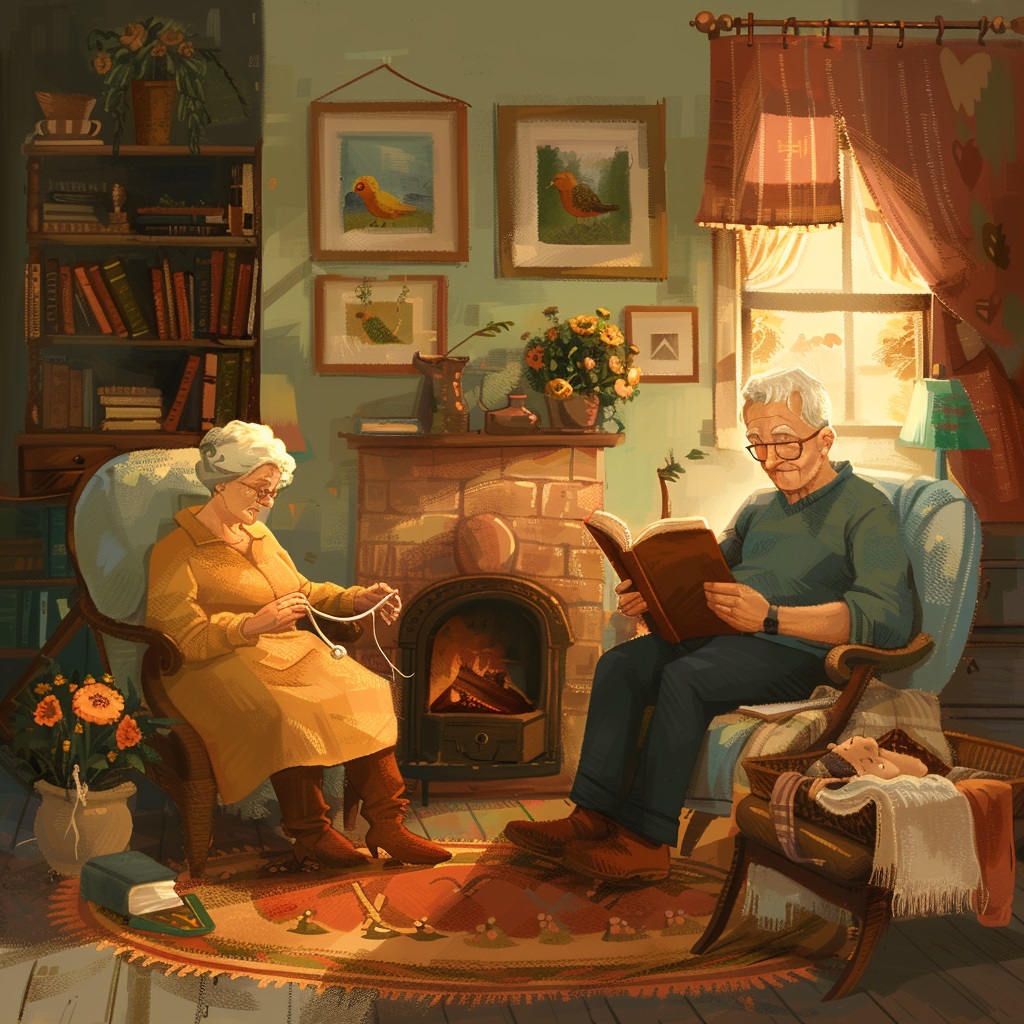
Hobbies and pastimes: Enjoying the simple pleasures that bring joy and fulfillment
Hobbies and Pastimes
- What hobbies or activities have brought you the most joy throughout your life?
- Everyone has something they love to do. Whether your grandparents were avid gardeners, enthusiastic readers, or skilled crafters, this question helps you uncover the activities that brought them the most happiness.
- How did you get started with these hobbies?
- Understanding how they developed their hobbies can be fascinating. Did they learn from a family member, pick up the hobby on their own, or was it something they discovered later in life? This can also give you ideas for hobbies you want to try yourself.
- Are there any skills or hobbies you wish you had tried?
- Regrets often tell us as much about a person as their accomplishments. This question allows your grandparents to reflect on the opportunities they missed or the interests they never had time to pursue. It also inspires you to explore new activities or skills.
Favorite Books, Movies, and Music
Books, movies, and music often have a special place in people’s hearts. They can evoke strong emotions and memories, serving as a soundtrack or backdrop to significant moments in life. These questions will help you discover the cultural touchstones that have impacted your grandparents most.
- What are some of your all-time favorite books and why?
- Books can shape a person’s worldview, inspire them, or provide a much-needed escape. Asking about your grandparents’ favorite books can reveal the stories that have resonated with them and why.
- Which movies have had a significant impact on you, and why?
- Movies can be influential, offering insights, entertainment, and emotional experiences. This question will help you understand which films left a lasting impression on your grandparents and how they relate to the themes or messages in these movies.
- What music do you enjoy, and has your taste changed over time?
- Music often reflects the times, but it also speaks to individual taste. Discovering what music your grandparents enjoy—or used to enjoy—can provide insight into the cultural influences that shaped them. It’s also a great way to share and compare music across generations.
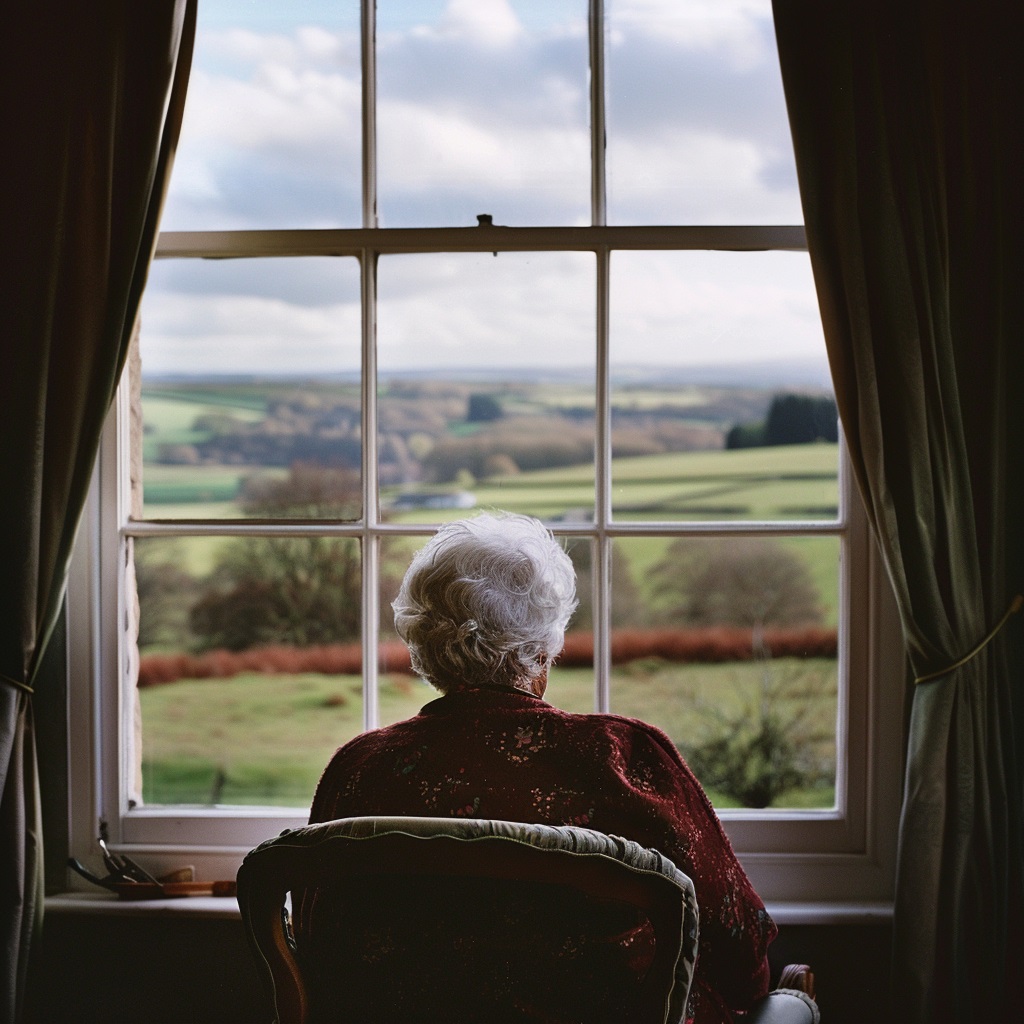
Reflections on life: Moments of quiet contemplation and looking back on a life well-lived.
Reflections on Life
As your grandparents reflect on their lives, they often gain clarity about what truly matters. These reflections can offer profound wisdom and a deeper understanding of their journey.
- What moments in your life are you most proud of?
- Pride often stems from accomplishments but can also come from small, meaningful moments. This question helps you learn about the achievements or experiences that your grandparents hold closest to their hearts.
- Are there any decisions you would have made differently?
- Regret is a part of life, and understanding your grandparents’ reflections on their choices can be enlightening. This question can lead to stories about lessons learned, the importance of decision-making, and the wisdom from hindsight.
- What brings you the most satisfaction in life today?
- As people age, their priorities and sources of satisfaction often shift. This question allows your grandparents to share what currently gives them joy: spending time with family, enjoying a hobby, or simply appreciating the small things in life.
Hopes and Dreams for the Future
Even as they reflect on the past, many grandparents think about the future with hope and aspirations. These questions will help you understand their vision for what lies ahead:
- What are your hopes for our family’s future?
- Grandparents are often deeply concerned about their family’s well-being. This question allows them to express their wishes for the next generation, whether about maintaining close family ties, achieving personal success, or continuing traditions.
- How do you envision the world changing in the coming years?
- Having lived through so much change already, your grandparents likely have thoughts about where the world is headed. Whether optimistic or concerned, their perspective on the future can provide valuable insight into the broader trends they foresee.
- What legacy do you hope to leave behind?
- This profoundly personal question invites your grandparents to consider how they want to be remembered. Whether through their values, actions, or the memories they’ve created, this question allows them to articulate the impact they hope to have on future generations.
Conclusion
The Importance of Preserving Grandparents’ Stories
Grandparents are living links to the past, offering a wealth of knowledge and experience. Their stories provide a sense of continuity and identity, connecting us to generations that came before us. Preserving these stories is not just about holding onto the past—it’s about understanding where we come from and the values that have shaped our family.
Recording these memories through writing, audio, or video ensures that future generations can learn from them. It’s a way to honor your grandparents’ lives and keep their legacies alive. These stories can become cherished family heirlooms passed down from generation to generation.
Encourage your grandparents to share their experiences openly and let them know how much you value their stories. Even the small, everyday moments can hold significant meaning and provide valuable lessons.
Encouraging Intergenerational Conversations
Conversations with your grandparents can strengthen family bonds in ways few other activities can. It bridges the gap between generations, allowing for a mutual exchange of knowledge and values.
To encourage these conversations, make it a regular practice. You don’t need a special occasion to sit down and ask your grandparents about their lives. Sometimes, the most meaningful conversations happen spontaneously during a casual visit or a family dinner.
If you’re not sure how to start, use the questions provided in this guide as a starting point. You might begin by asking about a specific event or period in their life and letting the conversation flow naturally. Be an active listener, showing genuine interest in their responses. This not only validates their experiences but also deepens your connection.
How to Keep the Dialogue Going
Building a habit of talking with your grandparents regularly can keep the dialogue going. Here are some tips to help you maintain these meaningful conversations over time:
- Schedule Regular Visits or Calls:
- Whether it’s a weekly phone call or a monthly visit, consistency helps keep the relationship strong. Even if the conversations are brief, the regularity shows that you care.
- Use Technology:
- If distance is an issue, use video calls to stay in touch. Technology can make it easier to share moments together, no matter how far apart you are.
- Create a Shared Project:
- Consider working on a family history project together. This could involve compiling stories, creating a scrapbook, or recording a documentary. Having a common goal can make the conversations more focused and productive.
- Involve the Whole Family:
- Encourage other family members, including younger generations, to participate in these conversations. This spreads the responsibility and ensures that everyone benefits from the shared knowledge.
- Celebrate Milestones:
- Use birthdays, anniversaries, and other special occasions as opportunities to reflect on your grandparents’ lives. These events provide natural moments to share stories and express appreciation.
By following these steps, you can ensure that the conversations with your grandparents continue, growing more prosperous and meaningful over time.
How can I start a conversation with my grandparents if we don’t usually discuss personal topics?
Starting a conversation on personal topics can be challenging if it’s something other than what you usually do. A good approach is to begin with light, open-ended questions about their daily life or interests, then gradually move into more personal topics as they become comfortable. You could start by asking about a recent event or activity they enjoyed, then transition into more in-depth questions as the conversation flows naturally.
What if my grandparents are reluctant to share specific stories or memories?
Respecting your grandparents’ boundaries if they’re reluctant to share specific stories is essential. Sometimes, memories can be painful or difficult to talk about. If you sense hesitation, gently move on to another topic and tell them they’re not obligated to answer anything they’re uncomfortable with. Creating a safe and supportive environment can encourage them to share more when ready.
How can I preserve my grandparents’ stories for future generations?
Consider recording the conversations with their permission to preserve your grandparents’ stories. You can use audio or video recordings or write their stories in a journal or digital document. Compiling these stories into a family history book or digital archive can be a meaningful way to ensure their memories are passed down. Involving other family members can also help create a more comprehensive record.
What are some ways to keep younger generations interested in their grandparents’ stories?
To engage younger generations, try to present the stories in ways that resonate with them. You could create a multimedia project that includes photos, videos, and audio recordings, or even a family podcast where the stories are shared. Involving children in asking questions or creating artwork related to the stories can also help them feel more connected. Making the stories relevant to their lives today by drawing parallels between past and present experiences can also spark their interest.
Is it ever too late to start asking grandparents about their lives?
It’s always possible to start these conversations. While it’s always ideal to begin as early as possible, any time spent talking and learning from your grandparents is valuable. Even if your grandparents are in advanced age or have health issues, there are often still opportunities to connect and learn from their experiences. Focus on the moments you do have, and make the most of the time together.
How can I involve my grandparents in family gatherings if they are less mobile or live far away?
If your grandparents are less mobile or live far away, technology can be a great tool to keep them involved. Consider setting up video calls during family gatherings so they can participate remotely. If possible, bring the family gathering to them by organizing smaller, more accessible events at their home. Sending them photos and videos or creating a live stream of the event can also help them feel included.
What are some creative ways to document my grandparents’ stories?
Beyond traditional writing, you can document your grandparents’ stories creatively. You could create a scrapbook combining their stories with photographs and memorabilia or a family tree with narratives about different ancestors. Digital storytelling tools allow you to create interactive timelines or maps that trace their life journey. Another idea is to create a video documentary or a series of short videos where they share different aspects of their lives.
How can I make sure my grandparents feel appreciated during these conversations?
Show appreciation by actively listening, asking follow-up questions, and expressing gratitude for the time they’re taking to share their stories. Compliment their storytelling and tell them how much their memories and wisdom mean to you. Small gestures, like bringing their favorite snacks during a visit or sharing how much they enjoyed a particular story, can also make them feel valued and appreciated.
What should I do if my grandparents’ memories are fading?
If your grandparents’ memories are fading, it’s essential to approach conversations with patience and understanding. Focus on positive and less stressful topics, and try to stimulate their memories with prompts like old photos, music from their era, or familiar scents. Even if they can’t recall specific details, the feelings and emotions associated with their memories are often still accessible. Cherish the moments of connection you can have, even if they aren’t always clear or detailed.
Can these conversations help with genealogy research?
Yes, these conversations can be a valuable resource for genealogy research. Your grandparents may provide names, dates, and stories to help fill in gaps in your family tree. They might also offer insights into family origins, migrations, and connections you wouldn’t find in official records. Recording their stories can complement and enrich your genealogical research, providing a complete picture of your family’s history.
What if I’m not close with my grandparents—how can I still have meaningful conversations?
If you’re not particularly close with your grandparents, start by finding common ground. Focus on topics that interest both of you, including hobbies, current events, or shared family members. Building rapport with light, non-intrusive questions can lay the foundation for deeper conversations later. It’s also helpful to approach these conversations with an open heart and a willingness to listen and learn, which can help bridge any emotional distance.
How often should I try to talk to my grandparents about their lives?
The frequency of these conversations depends on your relationship and their comfort level. Regular, but not overwhelming, conversations—such as once a week or a few times a month—can be a good rhythm. Focusing on quality over quantity is more important, ensuring that each conversation is meaningful and enjoyable for both of you. Even a monthly call or visit can be impactful if you live far away.
What can I do if my grandparents prefer not to talk about specific periods of their lives?
Respect their privacy and boundaries if they prefer not to discuss specific periods of their life. Some memories might be too painful or personal to share. You can gently ask if there’s anything else they’d like to discuss and be supportive if they choose to move on to another topic. Focusing on positive or neutral subjects can keep the conversation enjoyable and avoid uncomfortable areas.
Are there any specific techniques to help grandparents recall memories?
Yes, there are several techniques you can use to help jog your grandparents’ memories. Using sensory cues like old photos, familiar music, or scents can trigger recollections. Asking specific, open-ended questions that relate to their experiences can also help. For example, instead of asking, “What was your childhood like?” you might ask, “What do you remember about the house you grew up in?” Gentle prompts and patience are essential, as some memories may take time to surface.
Ancestry is a person’s lineage or heritage, including the various generations of family members who came before them. It often includes details about the origins, cultural background, and familial connections contributing to a person’s identity.
Cultural Traditions: Practices, beliefs, customs, and rituals passed down through generations within a family or community. These traditions often hold significant meaning and are associated with cultural or religious heritage.
Family Dynamics: The patterns of interaction, relationships, and roles within a family. Family dynamics can include how family members communicate, relate, and support one another.
Genealogy is the study and tracing of family lineages and histories. It involves researching and documenting the ancestry and descent of a person or family, often through historical records, oral histories, and genetic information.
Historical Events are significant occurrences or developments in history that have impacted societies, cultures, and individuals. Examples include wars, political changes, social movements, and technological advancements.
Hobbies are activities or interests that a person regularly engages in for enjoyment and relaxation. Hobbies can include various pursuits, such as gardening, reading, crafting, or sports.
Legacy: The lasting impact, contributions, or memories a person leaves behind after passing away. A legacy can be expressed through values, achievements, family traditions, or personal influence on future generations.
Memories are recollections or remembrances of past experiences, events, or moments in a person’s life. They can be vivid and detailed or faint and fragmented, and they often carry emotional significance.
Milestones are significant events or achievements in a person’s life that mark important transitions or stages. Examples of milestones include birthdays, graduations, marriages, and career achievements.
Oral History is the practice of recording or recounting historical events, stories, and personal experiences through spoken word. It is often used to preserve the memories and narratives of individuals, particularly those who may not have written records.
Resilience: The ability to recover from or adapt to difficult situations, challenges, or setbacks. Resilience is often demonstrated through perseverance, resourcefulness, and a positive outlook despite adversity.
Siblings are brothers or sisters who share one or both parents. Sibling relationships can influence a person’s life, shaping their experiences, personalities, and family dynamics.
Societal Changes are shifts or transformations in a society’s structure, behavior, or norms. They can be influenced by factors such as cultural trends, technological advancements, political movements, or economic developments.
Traditions: Established practices or customs followed regularly within a family, community, or culture. Traditions are often passed down through generations and hold symbolic or cultural significance.
Turning Points: Critical moments or events that lead to significant changes in a person’s direction or circumstances. Turning points can include personal decisions, life events, or external influences that alter the course of one’s life.
Values: Core beliefs, principles, or standards that guide a person’s behavior and decision-making. Values are often influenced by family, culture, religion, and personal experiences, and they play a central role in shaping a person’s identity and actions.
Wisdom: Deep knowledge, insight, or understanding gained through life experiences. Wisdom is often associated with making sound judgments, offering advice, and navigating complex situations effectively.
If you live in New York State and are caring for an elderly loved one, why not get paid for the care you’re already providing? At Pella Care CDPAS, we help families just like yours navigate the process of becoming a paid caregiver. Don’t miss out on this opportunity to support your loved one while earning an income. Give us a call today at 718-908-2273 (or 718-908-CARE) to learn more and get started!

Recent Comments